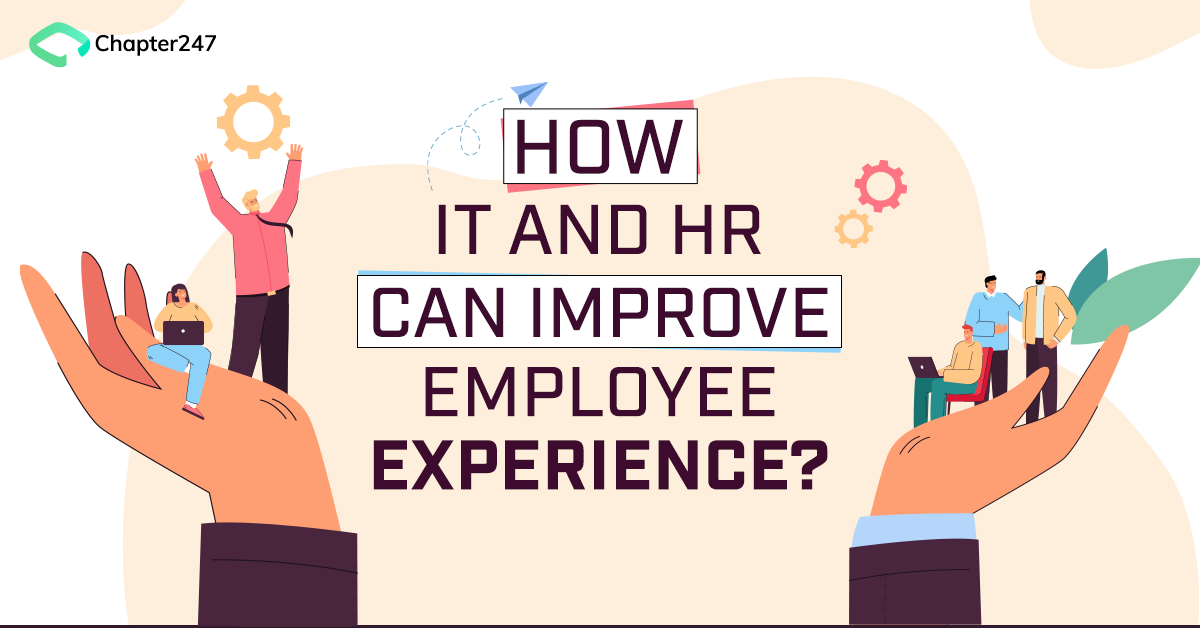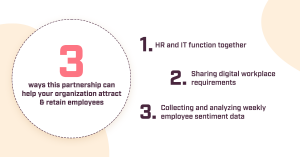People want to work flexibly at the moment and increasing turnover is a massive challenge for companies across the world. There is a huge opportunity for organizations to take advantage of this. Chief Human Resource Officers and Chief Information Officers are starting to work together more closely. Technology has created a dynamic environment for both HR and IT. As more businesses are reliant on technology, the need to support this investment is growing. This is a good thing because it’s the only way to handle what’s becoming a much bigger challenge.
With time, it’s getting pretty clear that people are going to want to work for places with an employee-first mentality, and organizations without these initiatives will be left behind. This trend is only going to continue. CIOs and CHROs are now finding themselves working in tandem to raise EUX in order to keep their organizations up and running in the race for the best talent.
When HR and IT work together, they can get a better insight into your company’s needs & help you support the staff. The key is creating a seamless & secure system that not only works, but also looks good.
Below are the three ways the perfect partnership between HR and IT can help your organization attract and retain its employees.
1. HR and IT function together
HR and IT are no longer able to operate as two distinct functions, each with different strategies and missions. Instead, they should rather combine their efforts around a common vision of creating digital employee experience (DEX). Providing a seamless and personalized employee experience has been the key to easing tensions in HR, IT and Quality. “Companies that have adopted digital HR processes with artificial intelligence have seen great results.”- shared Olga P. Bismark, president and CEO of the Institute for Professional Development in a recent article.
Companies with their employees best harnessing the power of data and analytics-along with unified communication and collaboration-enjoy both a boost in organizational performance, as well as better quality of life for their people around IT security and flexible work hours.
General consensus is that EUX needs to be measured and managed in a way that it makes the employees feel heard and valued. Data analytics can help with this by finding out what programs are best for employee satisfaction and leading HR accordingly.
Both the CIO and CHRO can use data that HR collects on employees to help make IT better while also using IT insights to make HR processes better. For example, HR might find that many employees report they feel stressed or unsatisfied with their current workload. IT can see this pattern of employee dissatisfaction and recommend to HR changes in policies and procedures to help alleviate the stress. The CIO and CHRO work together with IT leaders who want to use data analytics not just for themselves but also to assist other functions within. It’s time that we start sharing our information with them.
2. Sharing digital workplace requirements
To support the latest digital workplace technologies, it’s vital for a CHRO to share their requirements with the CIO and let them know what needs to be done.
There are a wide range of benefits that employees want, and it can be tough for HR teams to meet them all. While you might be able to satisfy some requests regarding salary, how much time off is allowed or the provision of health care, you’re also likely to hear about expectations related to EUX.
Vacationing during the pandemic has paved the way to remote work – and now, it’s expected. If all other factors are equal, companies can gain a competitive edge by offering flexible digital workplaces or remote-office equipment.
Similarly, the exit interviews we run with people who were thinking of leaving the company revealed that they often chose to resign due to a lack of technology that lets the team work seamlessly. This can make it difficult for a company to stay competitive. Make sure you figure out which kind of technology is most important to existing and potential employees.
3.Collecting & analyzing qualitative data
Collecting & analyzing qualitative data weekly is key to maintaining your company’s health. How employees feel about the business can affect many other aspects such as their productivity, retention, and loyalty. The use of AI writers can help identify trends with your employees too. It’s real-time data that helps you figure out what issues are affecting your staff. For example, you might see an increase in the number of sick days and realize there might be some kind of virus going around.
Today’s CIOs are doing more than ever before. They are monitoring the performance of your desktop’s OS and apps, including boot time, crashes, internet latency and video call quality to ensure you have an optimal experience.
These days, technology offers are great tools to help employers make qualitative conclusions about their staff. A common workplace scenario is whether they seem to be happy in their job or not. Tools like these will help, for example, IT departments draw conclusions on how often an employee is spending time with a supervisor and the frequency of back-stop meetings in a day, which can lead to burnout and fatigue or low productivity.
Additionally, IT teams can also regularly conduct employee satisfaction survey and relay through the workforce to quickly detect trends related to employee satisfaction. It’s worth noting that they can complete this task quickly and easily, which is why we highly recommend them. DEM allows you to slice and dice experiential data by job role, region, country, age group and business unit. This enables them to identify any correlations using device performance data they collect.
What Chapter247 does to improve Employee Experience?
Chapter247 believes in Magnifying People’s Strengths. Using authentic data points such as ENPS, we tend to identify the points of improvements and create a positive culture, where employees feel they can take risks and be creative. By creating an environment that values high-quality work and performance from all, it creates a sense of trust in their employers. Furthermore, by setting clear expectations, we reduce the amount of unnecessary stress and tension that is placed on our people. Excited to learn more about us? Click here!









